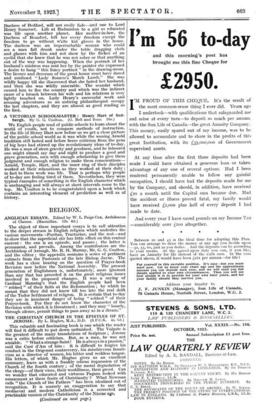LADY HENRY SOMERSET. By Kathleen Fitzpatrick.. (Jonathan Cape. 10s. 6d.)
LADY HENRY SOMERSET. By Kathleen Fitzpatrick.. (Jonathan Cape. 10s. 6d.)
Those who desire to be entertained by a new book other than a novel should read Miss Fitzpatrick's life of Lady Henry Somerset. In it they will find a picture—a rather ugly picture—of mid-Victorian aristocratic life, with its blatant severities, its hidden laxities, and its altogether admirable dignity. Lady Henry Somerset's mother was a Miss Pattle, one of the beautiful and very lonely daughters of. Colonel Pattle, known to his generation as the greatest liar in India." An entirely worldly and pleasure-loving woman, she brought up her daughters on strict conventional lines. Their schoolroom was their prison, their gaoler their governess. No sooner were they grown up than the two eldest were married by their mother's direction, one to the Duke of Bedford—the memory of the admirable Adeline,
Duchess of Bedford, will not easily fade—and one to Lord Henry Somerset. Life at Badminton to a girl so educated was life upon another planet. Her mother-in-law, the Duchess of Beaufort, left her every freedom except the freedom to go without w!iite kid gloves in the house. The duchess was an imperturbable woman who could see a man fall drunk under the table dragain„, g cloth and glasses with him and not show by the flicker of an eyelid that she knew that he was not sober or that anything out of the way was happening. When the portrait of her husband's mistress was sent her by the painter she expressed a desire to hang "this fancy portrait" in the drawing-room. The licence and decorum of the great house must have dazed and confused "Lady Somers's March Lamb." She was wildly happy till she discovered that she hated her husband, and then she was wildly miserable. The scandal which caused him to flee the country and which was the indirect cause of a breach between his wife and his relations is very lightly touched on. Lady Henry's successful work and amusing adventures as an untiring philanthropist occupy the last chapters, and they are almost as good reading as the first.



























































 Previous page
Previous page